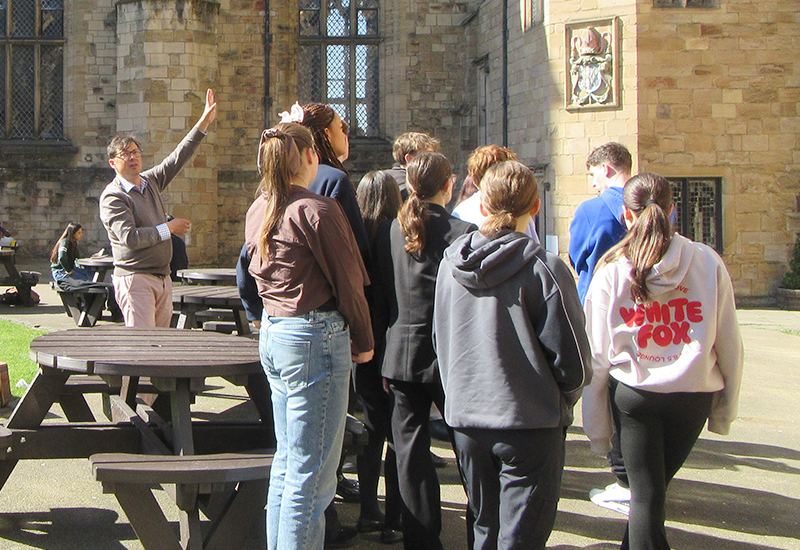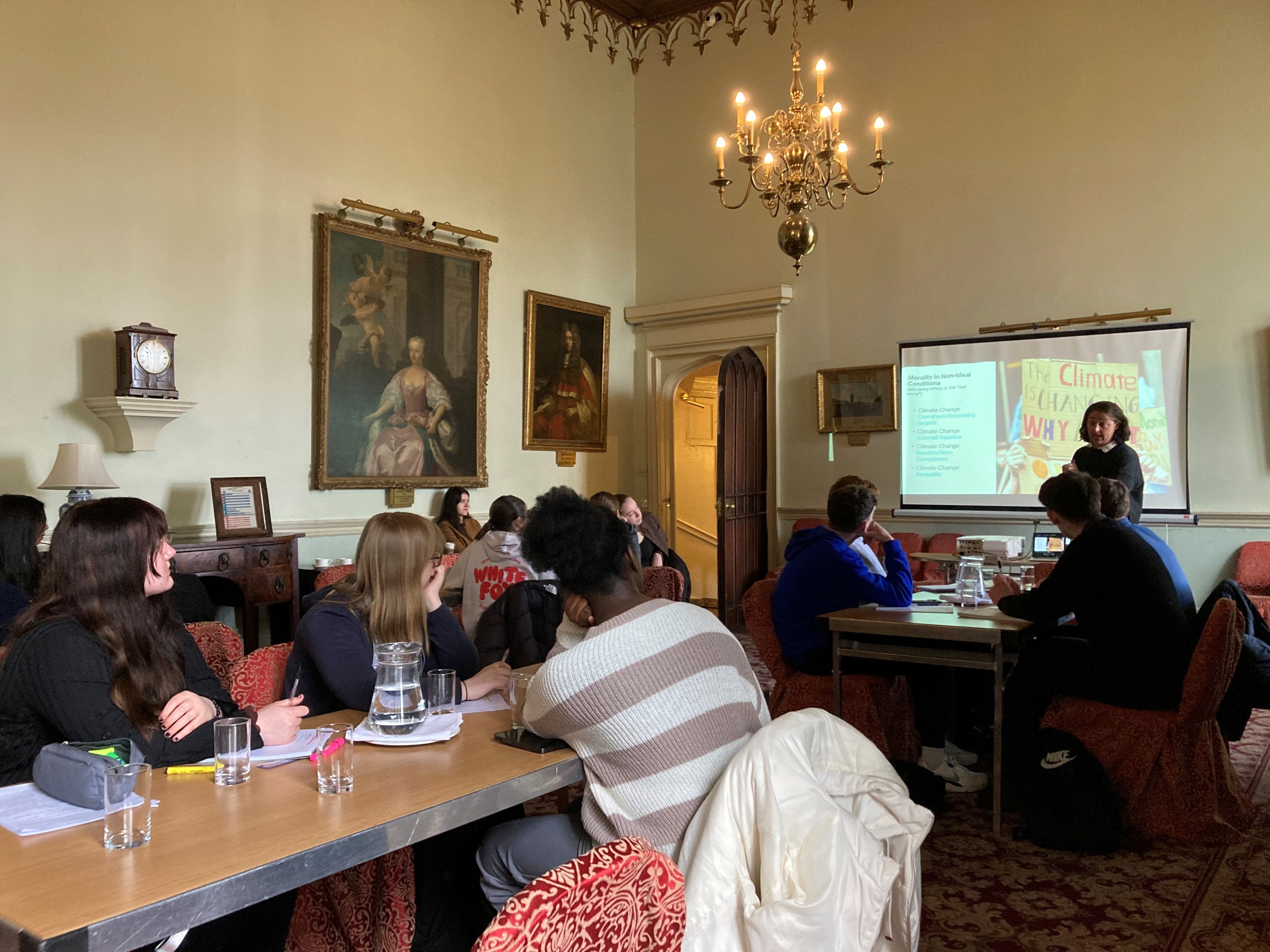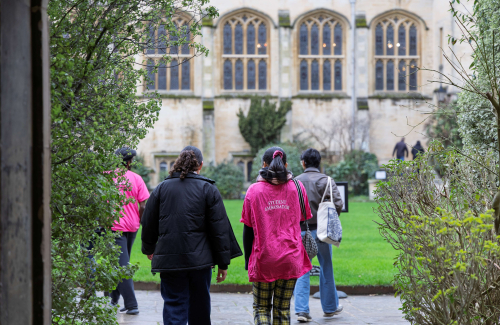More Pembroke news
‘An utterly invaluable experience’: OxNet Pupils Attend Seminars with World-Leading Academics
NEWS |
How can we measure the resurgence of religion? Can tortoiseshell cats ever be male? How might we define “the Gothic”? Year 12 OxNet pupils considered these questions and more during this year’s programme of subject-specific seminars, delivered by leading academics from Pembroke and beyond. Our Access and Outreach team offer us an insight into the academic content and aims of the seminars, presented alongside testimonials from the pupils themselves.

Photo credit: Claire Porter
Since late February, pupils across six of our OxNet programmes – English, Humanities, Languages, Philosophy & World Religions, Science, and Social Science – have taken part in subject-specific seminars led by academics at Pembroke as well as other Colleges, universities, and third-sector organisations. Each seminar series, either six or eight weeks in length, sought to prepare Year 12 pupils for learning, discussion, and research at university. They received compulsory reading lists for each seminar, each pitched at first-year undergraduate level, and engaged in conversations relating to History, Economics, Politics, Law, Biochemistry, Physics, Robotics, Philosophy, Theology, Language, and Literature. Individual seminars introduced pupils, for example, to gene expression mechanisms, urban history, reinforcement learning algorithms, law and ethics, and the reception of abolitionist texts, among many other topics.
“OxNet has been an utterly invaluable experience. I feel honoured to have been granted such an exceptional opportunity, and hope that future students will enjoy it as much as I have!” - Lúa (OxNet English, 2025)
The organising theme of the Humanities seminar series was ‘Thinkers and Cultures’. By drawing together sociological, anthropological, historical, and classical lines of enquiry, the series invited pupils to examine questions of reason, religion, and toleration; scarcity, choice, and fairness; as well as approaches to revolution and upheaval. In this vein, the Social Science seminar series was centred around inequality, touching upon social mobility, power distribution, human rights, water security, and legal reform issues across the globe. At its core, the series encouraged debate on practical approaches and theoretical frameworks for creating a more equitable society. Related topics were explored in the Philosophy & World Religions series, which was titled ‘The Challenge of Religion: Problems and Solutions in a Time of Global Crisis’. Spanning Philosophy, Theology, Politics, Anthropology, and Law, among other disciplines, the seminars considered issues such as environmentalism; women’s rights; cultural exchanges between the Global South and Global North; populism; and laws of religious freedom.
“I felt actively challenged to think critically and to engage with the texts in depth; more like an undergraduate at university, and less like a secondary student. As cliché as it may sound, I've gained more confidence and learned to be unafraid of taking initiative." - Kinga (OxNet Languages, 2025)
The seminar series for the OxNet English programme, run in partnership with Oldham Sixth Form College, focused on postcolonial literature and thought. Through the study of novels, plays, and poems from the early modern period to the present day, the series paid particular attention to texts that explored racism and inequality alongside gender, sexuality, environmental poetics, and the notion of hybridity. The study of literature was similarly central to this year’s Languages programme, which was titled ‘Narrative Identities’. Seminars by leading academics from Oxford as well as Queen Mary, University of London and Princeton University examined such topics as autobiography and subjectivity; migration, exile, and in-betweenness; and intersectional thinking with gender, race, disability, and class.

The OxNet Science seminar series encompassed numerous areas of scientific study, from artificial intelligence to protein folding chemistry. This year, pupils attended seminars in Biology,
Chemistry, Physics, Engineering, and Computer Science, and learnt to use mathematical models to computationally manipulate and analyse data. Scientific research has also been an important part of the OxNet Heritage-360 programme, which runs in partnership with Durham University, and seeks to connect cross-disciplinary research and practices relating to natural and cultural heritage. In lieu of a seminar series, the Heritage-360 cohort participated in a Spring Conference that took place in early April and spanned disciplines including the Visual Arts, History, Archeology, and Biosciences. You can read more about it here.
With Thanks
The Access and Outreach team would like to thank the following for leading seminars as part of our OxNet programmes:
Prof. Andrew Baldwin, Prof. Brian A’Hearn, Prof. James Read, Prof. Justin Jones, Prof. Nick Hawes, Prof. Ushashi Dasgupta, Dr Craig Holmes, Dr Eamonn Molloy, Dr Faisal Khalil, Dr Farrah Raza, Dr Gehan Gunatilleke, Dr Nicholas Cole, Dr Peter Claus, and Ms Nabeelah Jaffer (from Pembroke College).
Prof. Giles Gasper, Dr Adrian Green, Dr Annabel Cox, Dr Jonathan Long, Dr Kristen Hopper, Dr Richard Lee, Dr Simona Capisani, Dr Tim Middleton, Dr Thomas Hird, Mr Yassine Ait Ali, Mr Felix Slade, Ms Holly Roach, Ms Medha Mukherjee, and Ms Megan Bruton (from across the University of Oxford, Durham University, and other institutions).
We would also like to thank our OxNet Coordinators across the country – Ms Alex Noble, Mrs Claire Porter, Ms Claire Tattersall, Mr David Jones, Mr Guy Smith, Mr Paddy McDevitt, and Mr Sotiris Olousegkoun Maragkos-Aouomouti – for their support and assistance throughout.
Finally, our thanks go to the pupils, including those who agreed to share testimonials with us; all of these can be found on the OxNet website.
"I have loved my time on OxNet. I’ve learnt how to take writing in context and link it to everyday life, I’ve learnt how to find information in a given text and finally how to formulate my ideas in a passionate and enthusiastic debate in our weekly seminars. I feel that I have grown in confidence in my own knowledge and skill in organising this knowledge in a concise and interesting way as well as making lots of like-minded friends along the way!" - Alice (OxNet Humanities, 2025)
"I have found OxNet both challenging and exciting during my time on the course. I have learned how to manage a workload with lots of (sometimes difficult) reading in order to understand new concepts. The seminars were particularly enjoyable, learning about topics in a way that felt new and invigorating, especially when we engaged in group debates and discussions. I feel that I have broadened my horizons academically, especially when writing the undergraduate-style essay, and I have enjoyed working with both the lecturers and the other pupils on the programme." - Matteo (OxNet Social Science, 2025)

